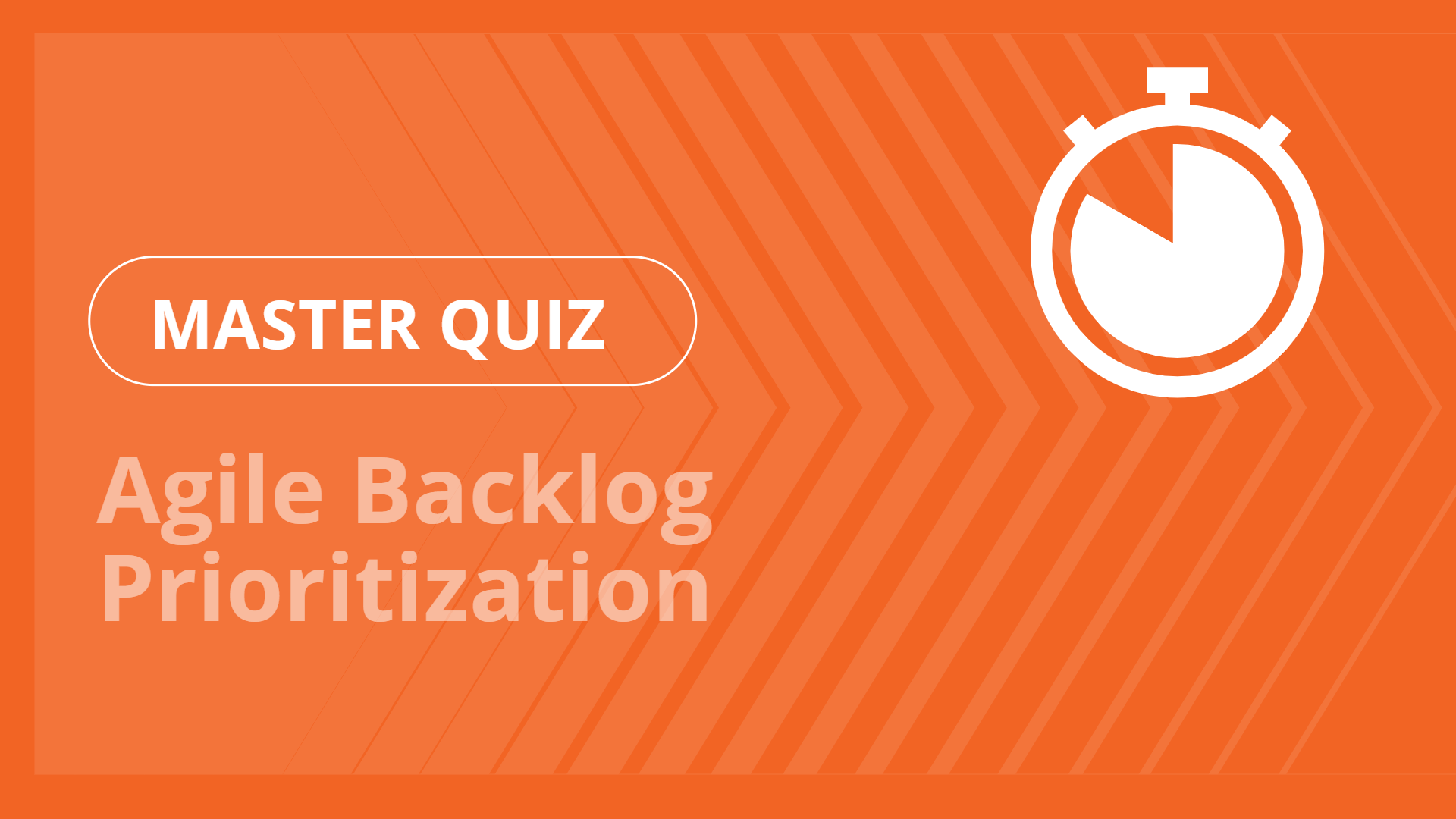Agile backlog prioritization

This e-learning course "Agile Backlog Prioritization" will help you to better master this topic in a professional context.
The aim of this course is to help you identify the strategic issues of good prioritization.
The examples, scenarios and case studies are designed to be easily transposable into different professional contexts and types of organizations.
Prerequisites
No specific prerequisites are required to follow this course.
Target Audience
Managers, HR managers and employees concerned with the topic of "Agile Backlog Prioritization".
Content
The course is structured into several complementary modules, combining theoretical input, practical exercises and interactive activities to facilitate the appropriation of concepts.
Training path
 Why prioritize tasks in agile methodology?Module 1 of the "Agile Backlog Prioritization" course, part of the e-learning theme: Project Management & OperationsWhy do some Scrum teams create more value…
Why prioritize tasks in agile methodology?Module 1 of the "Agile Backlog Prioritization" course, part of the e-learning theme: Project Management & OperationsWhy do some Scrum teams create more value…Module 1 of the "Agile Backlog Prioritization" course, part of the e-learning theme: Project Management & Operations
Why do some Scrum teams create more value than others?
Because the ability to intelligently prioritize the backlog makes all the difference. This module takes you on an essential awareness journey for every Product Owner: prioritizing well means effectively impacting the product, the team, and the end user.
This module can be taken alone or integrated into our complete "Agile Backlog Prioritization" course, designed to enhance your mastery of agile management in daily practice.
You will discover:
• Why prioritization is never "just a step", but the engine of agile delivery.
• What the concrete risks of a poorly prioritized backlog are: deviations, misalignment, customer frustration.
• How a good order of priorities can transform your sprints into value levers.
• What immediate benefits for collaboration with your development team.
• The direct link between prioritization and customer satisfaction: deliver better, faster, with purpose.
A crucial module for anyone who wants to give meaning to product choices in agile mode, avoid unnecessary development, and strengthen the real impact of each user story.
Particularly suitable for profiles:
• Product Owners
• Agile project managers
• Product managers
• Scrum Masters
Integrate this module into a complete skills upgrade or start with this key chapter to strengthen your agile decision-maker posture.
 Agile prioritization frameworks for project managementCan be followed alone or integrated into the e-learning path "Project Management & Operations"🎯 Bring clarity and impact to your product prioritization decisions.In an…
Agile prioritization frameworks for project managementCan be followed alone or integrated into the e-learning path "Project Management & Operations"🎯 Bring clarity and impact to your product prioritization decisions.In an…Can be followed alone or integrated into the e-learning path "Project Management & Operations"
🎯 Bring clarity and impact to your product prioritization decisions.
In an agile context, where change is constant and resources are limited, the ability to effectively prioritize the backlog becomes a strategic skill for any Product Owner.
This module allows you to master the fundamentals of agile prioritization, through a clear and practical overview of the most commonly used methods in high-performing teams.
On the agenda:
- Understand the key criteria for ordering User Stories.
- Explore the most recognized frameworks:
- The value/effort matrix: Identify quick wins and avoid energy sinks.
- The WSJF – Weighted Shortest Job First: Rationally sort according to economic value.
- The MoSCoW method: Clarify priorities with stakeholders.
- Apply a reading grid to guide strategic trade-offs in sprint planning.
Whether you are in the process of upskilling or looking for a structured framework for your planning workshops, this module addresses your immediate challenges of productivity and agile management.
👉 An autonomous module AND a centerpiece of the overall "Project Management & Operations" path.
Ideal for strengthening your position as a Product Owner in front of the development team and business stakeholders.
 Agile prioritization techniques for project managementE-learning training module — Independent or integrated into the “Project Management & Operations” pathwayPrioritizing effectively means making impactful decisions.Are you a Product Owner, Scrum…
Agile prioritization techniques for project managementE-learning training module — Independent or integrated into the “Project Management & Operations” pathwayPrioritizing effectively means making impactful decisions.Are you a Product Owner, Scrum…E-learning training module — Independent or integrated into the “Project Management & Operations” pathway
Prioritizing effectively means making impactful decisions.
Are you a Product Owner, Scrum Master, or involved in agile project management? This module provides you with a direct, operational, and structured approach to organizing your backlog and making informed decisions during key moments like Sprint Planning.
Accelerate your skill development through:
• A guided practical application of the most proven prioritization methods (MoSCoW, WSJF, business value…)
• Interactive real-life cases to practice prioritizing user stories in realistic situations
• Field experience feedback to avoid common pitfalls
• Immediately reusable tools to make better product decisions starting tomorrow
This module can be taken alone or as an essential step in the overall “Project Management & Operations” pathway dedicated to performance in agile mode.
Who is this module for?
• Product Owners needing to strengthen their decision-making posture
• Members of product or tech teams involved in decision-making
• Agile trainers and coaches looking for concrete support for their coaching
The result? Greater clarity in your roadmap, productive team decision-making, and customer value delivered more quickly.
 Prioritizing Practices in a Professional ContextAre you a Product Owner, Scrum Master, or any stakeholder involved in prioritizing the agile backlog? This module is for you.Integrated into the "Project…
Prioritizing Practices in a Professional ContextAre you a Product Owner, Scrum Master, or any stakeholder involved in prioritizing the agile backlog? This module is for you.Integrated into the "Project…Are you a Product Owner, Scrum Master, or any stakeholder involved in prioritizing the agile backlog? This module is for you.
Integrated into the "Project Management & Operations" pathway, this module can also be taken independently for those who wish to improve their skills in the art of agile prioritization in real situations.
Issues addressed in this module:
- Struggling to choose between two urgent user stories?
- Lack of clarity on business value or technical feasibility?
- Are you looking to make better decisions during sprint planning?
This module immerses you in an advanced situational exercise, through three interactive practical cases.
You will be required to:
- Question the true business value and its impacts
- Confront multiple stakeholders with sometimes divergent objectives
- Prioritize features while considering technical constraints
- Choose methodically and rigorously, in a realistic agile context
And to validate your learning, an immersive quiz at the end of the module will allow you to measure your progress and reinforce good operational reflexes.
Why take this module?
- Field approach, directly applicable in your projects
- Strengthening your role as a Product Owner within a Scrum team
- Gaining confidence in agile participative decision-making under constraints
Make better decisions, faster, with more clarity.
Train yourself in agile prioritization through practice.
 Master quiz - Agile Backlog PrioritizationWhat if you tested your knowledge while having fun, all while strengthening your skills as a Product Owner?Dive into an immersive and challenging quiz,…
Master quiz - Agile Backlog PrioritizationWhat if you tested your knowledge while having fun, all while strengthening your skills as a Product Owner?Dive into an immersive and challenging quiz,…What if you tested your knowledge while having fun, all while strengthening your skills as a Product Owner?
Dive into an immersive and challenging quiz, solo or as part of the complete "Project Management & Operations" pathway, to validate your mastery of agile backlog prioritization.
Inspired by the famous game show format (you know, the one with the jokers), this module challenges you:
15 questions to reach the top and become an expert in prioritizing user stories… or fall back to one of the 3 safety levels!
What awaits you:
- 15 progressive questions that increase in difficulty as the game progresses
- 3 key checkpoints that ensure your progress even in case of mistakes (levels 5, 10, and 15)
- 3 strategic jokers to help you out of complex situations:
- The 50/50: two wrong answers are removed
- The agile teammate: get the opinion of a product management expert
- Team vote: a collective estimate guides you towards the best decision
What is the purpose of this module?
- ✔ Self-assess on a central topic of the agile approach
- ✔ Identify your areas of mastery and points of vigilance
- ✔ Experience prioritization through questions close to the field of Product Owners
- ✔ Consolidate your knowledge while staying engaged and motivated
This module can be taken independently or as a fun final step in the overall pathway to anchor the skills acquired around agile operations management.
